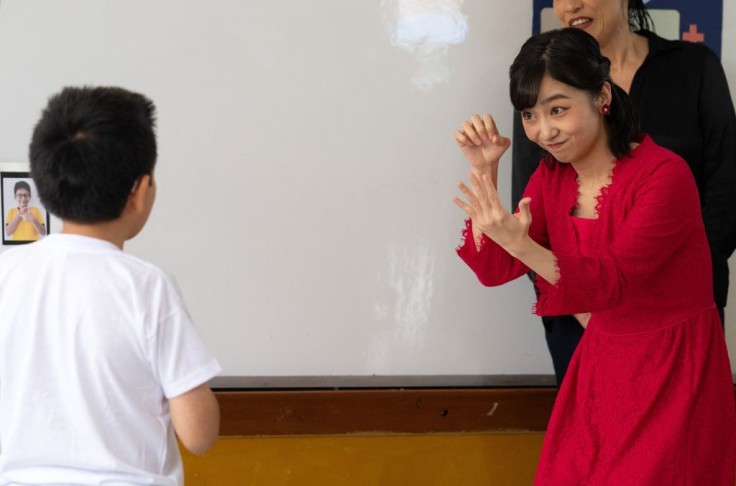
Raising children presents a myriad of fresh and exhilarating hurdles, yet Janet and Daniel Moreno encountered a distinctive challenge: both are deaf.
Despite experiencing doubts and fear from some quarters, the couple earnestly embraced the prospect of parenthood.
Two years ago, Janet delivered to their son, Luke, now 2, who was born with the capability to hear, joining a community of children known as CODA (Children of Deaf Adults).
Challenges Encountered by Individuals with Hearing Impairments
It's a typical occurrence-about 90 percent of children born to deaf parents can hear. Given that neither Janet, aged 35 nor Daniel, aged 31, were born deaf, they weren't surprised when Luke was found to have hearing abilities.
"We were overjoyed, and our reaction would have been the same even if he were deaf. Luke is perfect to us, not because he meets certain criteria, but because he's our child," Janet explains.
However, their journey hasn't been without challenges. Living in Maryland, the Morenos have encountered misconceptions about the deaf community, even before Luke's birth, particularly in their job searches.
"They viewed my deafness as an obstacle," Janet shares. "During interviews, many would inquire about the cost of hiring a sign language interpreter for the company and how I managed phone calls. These uninformed queries deeply affected me."
Persistently facing such obstacles, they also worried about Luke's acceptance of them.
"I was genuinely afraid of not being accepted, or of him feeling embarrassed by having deaf parents," Janet admits.
Fortunately, those fears subsided. "Watching Luke grow, it's heartwarming. He understands that I'm deaf but recognizes that it doesn't diminish my role as his mother," Janet says.
How Does Communication Pose Significant Challenges for the Family?
Communication poses a significant challenge for the family. At 2 years old, Luke's motor skills aren't developed enough for American Sign Language (ASL), so they've developed their gestures. Daniel emphasizes facial expressions and reads to Luke with animated flair, resulting in contagious laughter.
Due to the pandemic, exposing Luke to speech and social interaction has been challenging, compounded by the distance from their hearing extended family. The Morenos have noticed signs of a speech delay in Luke, likely due to limited social exposure.
"Like many, we've experienced isolation, which has hindered his socialization and conversation," Janet laments.
Instead of other options, they've turned to children's TV shows to facilitate Luke's verbal development, albeit temporarily. They also make regular FaceTime calls to family.
Daniel and Janet are committed to fostering both verbal and sign language communication, recognizing their importance in Luke's life.
"Sometimes, Luke can convey his needs through a certain look, and we understand him immediately. It's incredibly rewarding for all of us," Daniel remarks.
Yet, there are moments where parental instinct kicks in, especially when communication becomes more challenging due to their deafness.
Just before Luke turned 1, he had appendicitis, a rare occurrence in a young child. As deaf parents, they ensured an interpreter was available at the hospital to facilitate communication with the medical staff.
"Imagine being unable to communicate in the hospital as you desperately seek help for your child. It was a harrowing experience for us," Janet recalls.
While Luke is too young to fully engage with the CODA community, the Morenos have sought guidance from a close friend who is also a CODA.
They intend to familiarize Luke with other CODAs, akin to how their parents introduced them to the deaf community.
Their friend shared insights on Luke's speech delay, reassuring them that with speech therapy, he would develop normally.
"He assured us that Luke will be just fine," Janet says. "We've come to realize that it's not a matter of if Luke will succeed, but how we can help him realize his potential."
Both Janet and Daniel are committed to supporting the deaf community creatively, running an Etsy store featuring unique items like ASL-stamped rings and a puzzle with signs for each letter of the alphabet.
Having supportive friends has been invaluable, especially with young children. They've been fortunate to have friends offer dinner and check in on them regularly.
The Morenos are expecting another baby boy in October, unsure of his hearing status, but they plan to conduct early hospital hearing screenings to address any needs promptly.
Despite their challenges, the Moreno family wants others to understand that many of their experiences, both positive and negative, are universal to all families.
"We're just like any other family, albeit with some differences. Whether deaf, hard of hearing, or hearing, our goal as parents is the same: to raise our children. Parenting is tough, but kindness and support go a long way," Janet concludes.
Related Article : 5 Tips to Protect Your Child's Hearing